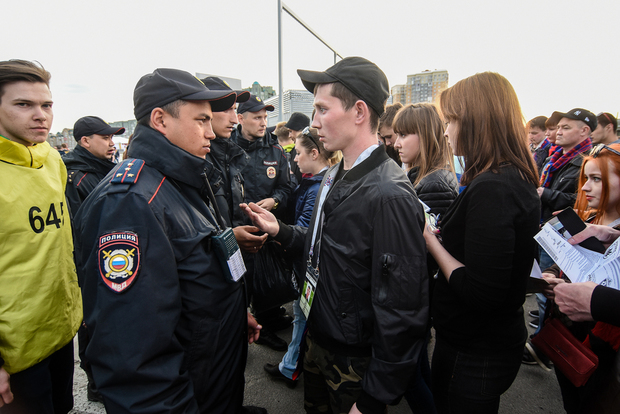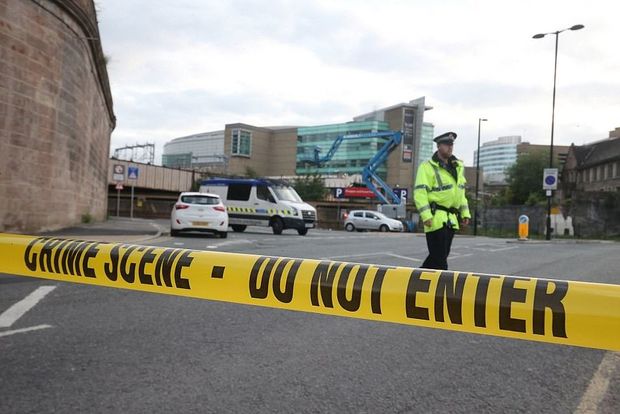FSB General about Manchester terrorist attack: ''It is almost impossible to defuse living bombs''
Lieutenant General Aleksander Mikhailov about the ''slackness'' of the British security forces and whether something like that may happen at 2017 Confederations Cup
The attack in Manchester, according to latest figures, claimed 22 lives. The explosion occurred at a football stadium. Given this, it involuntarily suggests a comparison with the forthcoming Confederations Cup — will the police in Russia be able to ensure the safety of fans? According to Major General of FSB in reserve, member of the Presidium of the Russian public organization Officers of Russia Aleksander Mikhailov, the two events cannot be compared, only intelligence work can neutralize a suicide bomber, and the police of any country at some point become ''slacked'' when ''a terrorist is left alone with a goalie and scores a goal''.
The terrorist attack at the football stadium Manchester Arena involuntarily suggests a comparison with the forthcoming Confederations Cup in Russia.
We compare things that cannot be compared. In Manchester, it was a concert, an ordinary event, they are certainly many, just as we have a large number of mass events with live entertainment and large crowds of people, it is first.
As for the Confederations Cup, we should keep in mind that it is an event of international significance, and forces and means that will be used do not correspond to the level which was used in Manchester. They are different by political importance events, which can not be compared.
We have broad experience in preparation and hosting of various events of cultural and sporting character. Operational work is conducted very carefully, which primarily excludes a penetration to bleacher seats of potentially hazardous people from the point of view of terrorist threat. The work starts far outside a stadium, and very often it is conducted across the country. These are two different circumstances that we should keep in mind.

''Operational work is conducted very carefully, which primarily excludes a penetration to bleacher seats of potentially hazardous people from the point of view of terrorist threat.'' Photo: Oleg Tikhonov
Don't you find it strange that the attack was carried out after the concert? The bomber was in the stadium for a few hours but nobody noticed him.
This is the first thing I noticed, the explosion was carried out after the concert, on the way out. The threat of a terrorist attack on the way out is connected with the fact that a large number of people crowd here, people are leaving the stadium, and naturally, it is a kind of pandemonium when a terrorist is being in the midst of the crowd. It is what they, apparently, expect.
Of course, people wonder why not directly at bleacher seats? Bleacher seats are an open place, and the distribution of fragments to a greater extent goes in the direction of the field. More likely, the terrorist was part of the concentrated mass, and therefore victims are many.
The question is how he got in there with all the explosives. Although we should keep in mind that if there was a strict system of security provision — magnetic frames, x-ray machines, still at the entrance to the stadium there was a crowd of people, and what is the difference for a terrorist where to explode – when entering or exiting? But the fact that the attack was committed on the way out indicates that the control system, we will not say that it was insufficient, but it had some holes.
Besides, we should bear in mind that security at the stadium, at the bleacher seats, as a rule, is provided not by police but stewards.
In the UK, the high terror threat level has long been declared and the police have repeatedly told about this to local residents. It turns out that they have missed it?
Most likely, they did not ''miss''. As I always say, the work begins far outside the stadium, and, apparently, there was no operational information of specific individuals. If it was, then it is necessary to investigate why they reacted that way – it is the question to internal investigation in the police itself. We should take into account the special structure of the UK police, which sluggishly interacts with each other — the police of Manchester, London and other cities are independent structures, they are subject to the municipality, although administered by the Ministry of Internal Affairs. In this situation, they treated this event as a regular event. It was not out of the ordinary event and, as a consequence, the Manchester police did not pay it much attention.

''We should bear in mind that the police of any country cannot to be constantly on full alert indefinitely. Of course, the ''red phase'' of the terrorist threat after some time subsides, and there comes a slackness – it is a general flaw of people, human resources are not unlimited.'' Photo: epa.eu
But, on the other hand, we should bear in mind that the police of any country cannot to be constantly on full alert indefinitely. Of course, the ''red phase'' of the terrorist threat after some time subsides, and there comes a slackness – it is a general flaw of people, human resources are not unlimited. As a result, a long period of operational stagnation leads to the point where a terrorist, ''is lef alone with a goalie and scores a goal''.
How can one resist a suicide bomber? Can they be neutralized if to detect directly at the entrance to the facility?
If we are talking about a suicide bomber, in 99,9% a terrorist achieves his goal after he took explosives and left the house — it makes no difference for him where to blow up. It is almost impossible to defuse living bombs. As experience shows, they have a dual system of the fuse — a conditional button that a terrorist can push himself and when an explosive device can be launched by remote control.
The only way to deal with suicide bombers is the intelligence work, which should be constantly carried out, but metal detectors, inspections to ensure the safety do not play the big role. Does that mean that the explosives can be blowed in a queue to walk-through metal detectors?
Absolutely right. We are living in a constant terrorist alert, and, as a consequence, issues associated with scanning of this potential environment — it is normal and natural daily work. So, when we talk about us, we should keep in mind that we have it constantly in sight. Any preconditions of preparation of a terrorist act during mass events, regardless of where these activities are carried out, are identified throughout the country.
As for the UK, there are many nuances associated with lifestyle and life values. Plus the legislation — very often, when there is a threat but the absence of sufficient evidence, the police of the West may carelessly refer to one or another information. We have repeatedly seen that in the process of investigation there appear the data, that a person was in sight, it was some kind of signals about him, but the police did not react — the total number of signals was huge and information on a specific person was little, and therefore any effective measures were not conducted. It should also be borne in mind because we are in different conditions of legislation, the police act within the framework of the principles and standards that are accepted in a particular state.